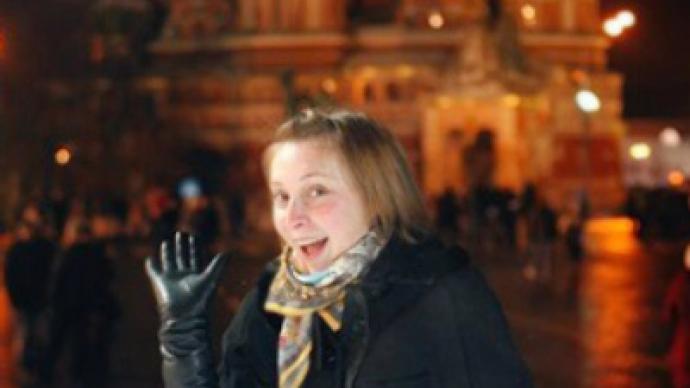The Battle of the Smiles: New York versus Moscow

One of the most frequently heard complaints from visitors to Moscow, besides the difficulty of mastering the mother tongue, is the shortage of teeth on the street. But some Russians say the criticism misses the point.
It’s yet another tortuous rush hour in subterranean Moscow, Europe’s most-populated metropolis, and you are crushed between soft fur coats and hard briefcases on the Metro, the capital’s vast subway system. To add insult to your bodily injuries, nobody is smiling. They may be sleeping, reading, talking or staring, but all of the faces seem to be chiseled from cold granite.
Personally, I find this complaint about Muscovites a bit outrageous. After all, how many sleepy people have a good reason to crack a toothy grin on public transportation, especially when they know that their final destination is the office or factory? So whenever I get back to the happy United States, it’s always entertaining to count the number of beaming smiles on the New York City Subway, for example, which can usually be calculated on the fingers of one hand.
Despite the similarities between America and Russia when it comes to flashing our incisors on public transport, there seems to be some truth to the criticism that Russians are stingier with their smiles.
But this particular cultural characteristic, it seems, is being mistakenly interpreted to mean that the Russian people are an unhappy, depressed lot, who should run to the nearest drug store for some Prozac.
Even Moscow's officialdom seems to be taking the smiling business rather seriously, and splashed out thousands of roubles on public service messages (which were plastered all over the mad Metro, of course) reminding Russians about their duty to smile in public. The ads featured an attractive blonde in some sort of official blue garb beaming from ear to ear with her manicured fingers pointing to the extreme edges of her smile. What won’t people do to pamper the tourists?
What next? Beat cops whose job it is to hand out tickets to frowning offenders? Smiling schools run by grinning Americans? Tickle sticks instead of riot sticks?
The subject of the elusive Russian smile has even made it onto the pages of this month’s Psychology Today magazine. In an article entitled “Global Psyche: National Poker Face,” Marina Krakovsky begins with the provocative, impossible-to-prove statement, “While it’s true Russians are generally less happy than Americans…” OK, wait a second there. Let’s hit the pause button on that comment. In fact, let’s rewind and play again: “Russians are generally less happy than Americans.” First, I’d really like to know where Miss Krakovsky dug up that little golden nugget of knowledge.
While as an American it is more difficult for me to speak about the subject of ‘Russian happiness’, I can say a word or two about American happiness: Nowhere else in the free world is the native population more heavily prescribed to anti-depression medication than in the United States of America (and mind you, that was before the financial crisis hit); nowhere else in the free world are people murdering each other at such breathtaking rates than in the good ol’ USA and nowhere else in the free world are smiling faces more abundant. So what gives?
Russians argue that their own native smiles, although more rare, are genuine, whereas the ubiquitous American variety, like plastic red carnations, are (sometimes) phony for the sake of politeness.
Linguist Iosif A. Stern of Russia’s Voronezh State University says that Russians don’t feel the need to smile out of mere politeness. In fact, to say that somebody “smiled out of pure politeness” is not the best thing to be said about a person standing around with a smile on his face.
And what about those stern Aeroflot stewardesses, who only seem to smile when the plane lands? Would it really be asking too much for them to spare a few teeth when they hand over my fish sticks and tea? But if the stewardesses, customs officials and shop attendants are dutifully performing their jobs in a professional manner, why should they also be expected to smile at everybody at the same time? And why are some people so offended when they are not greeted by a full set of teeth by every person they meet? Does this not say more about the psychology of the person who needs to see a smile, as opposed to the person who fails to provide one but yet performs their job in a meticulous manner?
In other words, how comfortable would it be to stroll around a city where everybody is wearing a forced (or forced to wear), a meaningless smile on their face? Or is it not more appealing to know that a smile, like the legendary Chinese undumbara flower, which blooms once every 3,000 years (although that may be pushing it), is truly the real thing?












